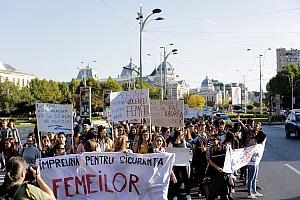NGOs announce nationwide march to end gender-based violence in Romania

The VIF Network has announced the Together for Women's Safety march, which will take place on October 23 in Bucharest, Cluj, Brasov, Timisoara, Sibiu, Iasi, Giurgiu, Mizil, and Valea Seacă. The event aims to draw attention to the problem of violence against women in Romania.
Under the slogan We're fed up with empty words, we want social services!, the NGOs are calling on the Romanian authorities to fund social assistance services for victims of gender-based violence and to allocate public funds for education, training, and awareness-raising programs (mandatory under Law 217/2003).
Currently, the NGOs consider that victims of domestic and sexual violence do not have enough protection from the state. Specialized social services for victims of gender-based violence are underfunded at both the local and central levels and are not sufficiently prepared to meet victims' needs.
The release states that victims of domestic violence are often left to suffer due to a lack of specialized centers. While every county urgently needs at least one specialized intervention center for victims of sexual violence, at present not even the 10 centers promised on paper are functioning properly.
Where these centers do exist, girls and women are ridiculed or even doubly traumatized by some staff. Lack of training programs, as well as misogynistic, racist, homophobic, or classist mentalities, contribute to the isolation of victims and their return to abusive relationships.
Another issue is that, even when they have a protection order issued against them, perpetrators are not properly monitored by the authorities and continue to commit acts of violence, in some extreme cases going as far as femicide, as the government has not implemented the system of monitoring aggressors with electronic bracelets, which it has repeatedly announced.
And while the public services specializing in gender-based violence are extremely weak, the number of cases of violence reported to the police is increasing year after year. In the first half of 2022, there were over 40,000 cases of domestic violence in which the police intervened, including over 9,400 situations of imminent risk.
Schools and universities lag behind in their duty to prevent and combat situations of abuse, sexual harassment, and bullying. And workplaces are unsafe spaces for women, where sexual harassment and discrimination frequently occur, as does the cover-up of such cases.
Cyberbullying and non-consensual pornography are other forms of violence that more and more people are falling victim to, and the authorities do not have the necessary tools to gather evidence and take action in such situations.
"We are sounding the alarm about the massive under-reporting of sexual harassment and violence cases, due to the misogynistic stigma and the multiple obstacles and retraumatization victims face when they want to seek help or make a complaint. Women's access to support services must be tailored to their traumatic context and needs, make them feel safe and treated with dignity," the organizers point out.
They believe that the political scene has recently been taken over by a conservative agenda, which they say "is slowly working to destroy the democratic fabric of our fundamental rights."
While on a declarative level the authorities advocate gender equality and the fight against gender violence, in reality, they adopt retrograde bills such as the one on banning information about gender identity in schools, media, and medical institutions. Additionally, the government has not yet approved the National Strategy on promoting equal opportunities between women and men and preventing and combating domestic violence, a document put up for public consultation on March 9, 2021.
The double-speak of the authorities, the NGOs say, leads to a stark reality where prevention programs and social services are deeply underfunded, understaffed, and unprepared to manage this major social problem.
"We are taking to the streets to ask decision-makers to put aside empty rhetoric and really support the fight against gender violence. We want human and financial resources to be allocated to combat all forms of violence against women so that our right to safety does not remain on paper," the organizers conclude.
The VIF Network organizations' demands can be supported by signing the public petition on funding adequate services for victims of gender-based violence here.
(Photo source: Romolo Tavani | Dreamstime.com)













